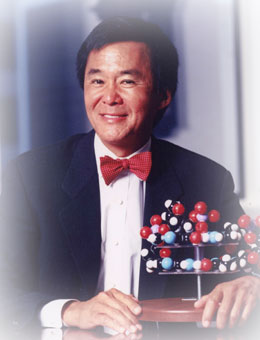|
ASIAN AMERICAN PERSONALITIES |
CONTACT US
|
ADVERTISING INFO
© 1996-2013 Asian Media Group Inc
No part of the contents of this site may be reproduced without prior written permission.
GOLDSEA | ASIAMS.NET | ASIAN AMERICAN PERSONALITIES
Titan of
Tech Trials
PAGE 5 OF 7

In any event, because the publisher ordered the reporters to reveal their sources, the lawyers who had been representing the publisher and the reporters had a conflict and I began to represent the lead reporter in the story. That attracted quite a bit of attention because of the background of the hostages and the newsworthiness of the issues related to the First Amendment. That's just another example of a case that doesn't relate to patents or technology or intellectual property. I started working on that case in the early 1980s.
GS: You won a $500 million verdict on a patent suit for the City of Hope in 2002. In a nutshell what was the fact situation?
MC: Pretty simple and straightforward. There were two claims. The first claim was that Genentech had breached a contract with the City of Hope. The basic promise was simple. City of Hope agreed to and did transfer ownership rights to all of the patents from a research program lock, stock and barrel, 100% ownership to Genentech. It ended up being 127 patents worldwide -- U.S., England, Italy, Spain and many many other countries. In return Genentech promised to pay 2% of sales of the companies to which it licensed the patent. It paid on some of those licenses, a pretty large sum of money, about $300 million over a quarter of a century. But what it didn't do was pay on 27 other license agreements.
The second claim had to do with breach of fiduciary duty. Genentech owes a duty to the City of Hope to deal with it fairly, to provide all the important information. Instead of doing that it basically concealed these license agreements. It was reaping the benefits of multiple millions of dollars on those license agreements and they were licenses of City of Hope patents.
GS: The breach of fiduciary duty is the basis for the $200 million punitive damages portion of the verdict?
MC: Right.
GS: It must have been a coup to sell the whole fiduciary concept in what seems essentially an arms-length business transaction.
MC: I wouldn't say it's a coup. I'd say we presented the facts to the jury and they basically decided whether the facts fit the claim by City of Hope that there was breach of fiduciary duty. I thought the facts cried out that there was a breach. As it happened, the jury agreed.
CONTINUED BELOW
GS: Although City of Hope sounds like a warmer fuzzier entity, isn't it a large cancer research center?
MC: The City of Hope today is a decent-sized institution, no question about it. Back in 1976 when they signed the agreement it was a much smaller institution. It didn't have a well developed internal staff. In all of the motions that Genentech made before the trial and after the trial they were trying to argue that they didn't breach any fiduciary duty to the City of Hope.
GS: What was the basis for finding a fiduciary duty?
MC: There was a case decided by a California appellate court which basically states that when someone trusts an invention to another under a set of circumstances to be exploited commercially, that they owe a fiduciary duty. And this is exactly that case. This was very inventive, brand-new technology and full ownership of the patent was turned over to Genentech lock, stock and barrel.
GS: You had another big verdict, $120 million, representing Stac Electronics against Microsoft. How do you get a jury all excited about awarding damages to a big corporation?
MC: You might even approach it with a lower threshhold: how do you get them interested? And then if you get them interested, how do you get them excited?
GS: How did you handle that?
MC: If one thinks about a case, it can be any case, a contract case, a business case of some kind, there are many elements that are real yawners. Who wants to read through a contract? And there's nothing in a patent that a regular human being can understand. On the other hand, the interactions of people are easy for everyone to understand and appreciate. The ability of jurors, no matter what walk of life they come from, no matter what their background, racial or ethnic group or gender or age or level of education, they're all human beings that have had life experiences. All of us have a nose for basics such as someone's lying to us, or they're being unfair or they're trying to take advantage of us. Sometimes very intelligent and accomplished people have the worst noses for those things. They overanalyze things whereas someone involved in construction or retail sales or from another walk of life have a better sense of how to read them.
No matter what the basic background or content the cases may involve, whether it's complex contracts or patents, they involve tests of credibility, credibility of the human beings who are testifying, credibility of the positions of the parties.
GS: So your focus as a trial lawyer was trying to bring out the conduct and attitudes of the key players?
MC: Absolutely.
PAGE 6
| "All of us have a nose for basics such as someone's lying to us, or they're being unfair or they're trying to take advantage of us." |
